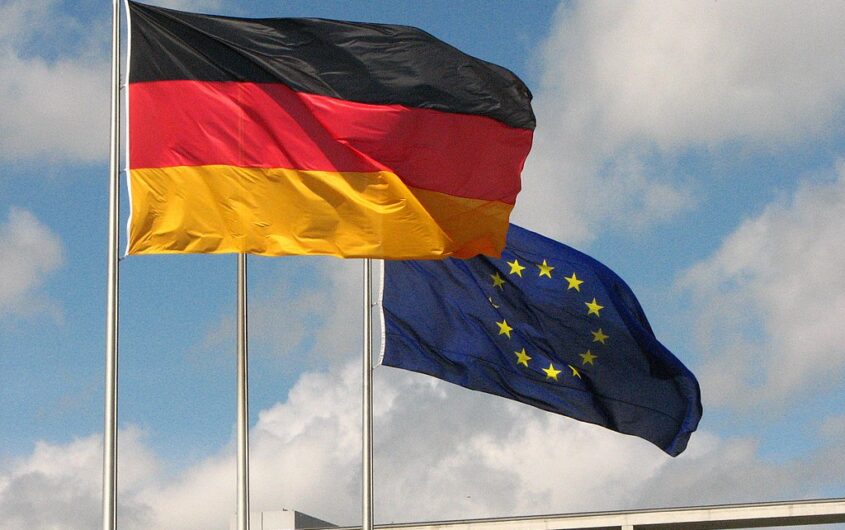
fdecomite via Wikimedia Commons
Unfriending Silicon Valley

Katharina Schindel
Halle Foundation/AGI Intern
Katharina Schindel is a summer 2025 Halle Foundation Intern at the American-German Institute. She is a rising second year graduate student in the European Studies program at Georgetown University’s School of Foreign Service, pursuing a concentration in international business and transatlantic diplomacy. Originally from Munich, Germany, Katharina earned her BA in political science and sociology from Ludwig-Maximilians-Universität (LMU), where she focused on EU-U.S. relations, and holds a certificate in U.S. politics from American University’s Washington Semester Program.
Prior to her graduate studies at Georgetown, Katharina worked as a project assistant for the Public Affairs Consultancy APCO Worldwide in Munich, where she provided geopolitical risk analysis for international clients in the tech and security space and supported high-profile political events, such as the Munich Security Conference. In addition, Katharina has further experience in transatlantic policy engagement, having previously served as a fellow at the Friedrich Ebert Foundation in Washington, DC.
Her research interests include the security sphere of the transatlantic relationship (specifically as it pertains to Germany and the United States) and shared issues on the emerging tech frontier for both sides of the Atlantic.
How Germany Is Leading Europe’s Breakup with Big Tech
In March 2025, Germany’s highest court handed down a ruling with global implications: Apple, it affirmed, is a company of “paramount cross-market significance for competition.” The phrase may sound technical, but the consequences are significant. It gives Berlin’s Federal Cartel Office (Bundeskartellamt) sweeping legal power to demand Apple reshape its business practices within Germany, from App Store restrictions to ad tracking policies and payment systems.
Andreas Mundt, head of the Bundeskartellamt, made the implications clear: the regulator will now move ahead with investigations into Apple’s anti-steering rules and advertising tracking protocols. Apple, long adept at pushing back on EU pressure in Brussels, suddenly found itself facing a parallel, and potentially more aggressive, enforcement front in Berlin.
Germany, in short, is doing more than simply enforcing Europe’s digital rules: it is setting a new pace.
Beyond Brussels: A New Center of Gravity
To understand the significance of Berlin’s assertiveness, it helps to zoom out. For over a decade, the European Commission has been the primary architect and enforcer of the continent’s digital rulebook. Its twin regulatory pillars, the Digital Markets Act (DMA) and Digital Services Act (DSA), are meant to constrain the power of dominant tech platforms and make digital ecosystems fairer and safer.
But Germany is charting its own course. Since 2021, the Bundeskartellamt has wielded enhanced powers under the reformed German Competition Act (GWB 10.0), which allows it to identify digital platforms with cross-market dominance and intervene early to prevent abuse. Unlike Brussels, which must follow slower procedural channels, Berlin can act unilaterally and (at least for a government known for its bureaucratically moderate-at-best pace) with surprising speed.
Apple is not alone. Meta, Alphabet, Amazon, and Microsoft have also been designated as objects of concern. Investigations into preferential treatment of in-house services, data interoperability, and user control are underway. This shows how Berlin has become a regulator in its own right, shaping digital conduct on its own terms without waiting for Brussels to move.
Germany’s unique blend of national assertiveness, legal precision, and sovereignty-driven policy is giving real teeth to Europe’s digital ambitions.
Germany is not the only EU country asserting national control over tech policy: France’s national data protection authority (Commission nationale de l’informatique et des libertés) has led on data privacy enforcement, Italy’s Competition Authority (Autorita’ Garante della Concorrenza e del Mercato) is scrutinizing platform self-preferencing by Apple, and the Netherlands have previously led their own probes into App Store and Google Play Store practices. But these efforts have often remained aligned with Brussels’ timelines. By contrast, Germany is deploying a more comprehensive model of parallel enforcement. While the European Commission moves to operationalize the DMA across twenty-seven member states, Germany is already seeking to reshape platform behavior at the national level.
This raises the question: Are we witnessing a more fragmented, multi-speed Europe in digital regulation? Or is Germany just doing Brussels’s job faster (and perhaps more aggressively)? Either way, Berlin is quickly becoming a capital of regulatory concern for Silicon Valley.
Sovereignty in the Server Stack
Germany’s assertiveness is not just about protecting consumers. At its core, it reflects a broader strategic shift: a push for digital sovereignty. Since the pandemic and the war in Ukraine, Berlin has begun to reevaluate its external dependencies—first in energy, now in digital infrastructure.
The government’s support for sovereign cloud initiatives is emblematic: Deutsche Telekom has partnered with Nvidia to build domestic AI cloud capacity, while German industry leaders resist efforts to liberalize EU rules that would benefit U.S. providers. Regulatory crackdowns have also reached platforms like DeepSeek, a Chinese-developed AI app facing a ban in Germany over GDPR violations and user data risks.
Berlin’s message is clear: Germany wants European infrastructure, European standards, and European control.
Washington’s View: Protectionism in Disguise
For American firms, Germany’s posture looks less like sovereignty and more like selective targeting. Apple now faces not only a €500 million DMA fine from Brussels but also broader constraints in Germany. Microsoft and Alphabet are also under (what they would deem) a regulatory microscope there.
The problem, from Washington’s perspective, is the emergence of a two-track system: EU-wide obligations layered with national enforcement that create compliance confusion and rising operational costs. U.S. industry groups and some lawmakers have argued that the burden falls disproportionately on American companies, framing it as digital protectionism dressed up as competition policy.
A New Normal?
In July 2025, Meta made a quiet but seismic move: it pulled the plug on all political advertising in the EU starting this October. The company blamed a tangle of “unworkable” rules. Stricter requirements around transparency, data access, and election integrity have made compliance too complex or risky, according to a Meta press release. For a platform already under fire from both U.S. and EU lawmakers, the safest move was, it appears, to walk away.
Around the same time, the United States and EU struck a hard-fought tariff truce. But one thing was notably off the table: digital regulation. “There is absolutely no commitment on digital regulation, nor on digital taxes,” a senior EU official told Politico. In other words, Europe’s digital rulebook, including the DMA and DSA, emerged unscathed.
That was not for lack of trying. U.S. negotiators and Big Tech lobbyists pushed hard to soften or sideline the rules. But Brussels held firm, and Berlin’s national enforcers had already proven that even an EU compromise wouldn’t be the final word.
The industry on the U.S. side is taking note of this. A July 2025 study by the Computer & Communications Industry Association estimated that EU digital rules cost American tech companies $97.6 billion annually, including roughly $1 billion in DMA compliance costs alone.
What’s at Stake
Germany’s rise as Europe’s lead tech enforcer has shifted the transatlantic dynamic. U.S. officials now face a regulatory ecosystem where national capitals like Berlin, not only Brussels, drive key enforcement trends. That complicates digital trade diplomacy, raises compliance costs, and fuels accusations of double standards from the United States.
If Berlin’s model gains traction, others may follow. France, Italy, and Spain could increasingly rely on national agencies to tailor digital enforcement to their own legal cultures and political pressures. This can create a notable risk: a fragmented landscape that challenges the EU’s promise of a single market.
At the same time, Germany’s assertiveness is winning fans at home. Political leaders see it as part of a broader strategic toolkit and a way to ensure European values, infrastructure, and competition principles are not drowned out by global platforms. Bavaria’s Minister for Digital Affairs Fabian Mehring, for example, recently suggested a “Digital Tax” on corporations with over $750 million in annual revenue.
Germany may not have a Silicon Valley, but it now sits at the center of Europe’s tech confrontation with the United States. Its unique blend of national assertiveness, legal precision, and sovereignty-driven policy is giving real teeth to Europe’s digital ambitions. As the EU writes the rules, Germany is setting the tone for how they land.
In Washington, the return of the Trump administration has raised the temperature. During his first term, Trump retaliated against France’s digital services tax with tariff threats. Earlier this year, Canada rescinded its Digital Service Tax Act to get the United States back to the negotiating table. While the EU’s DMA and DSA survived the most recent U.S.-EU tariff deal negotiation, if Germany continues to hammer U.S. firms, it runs the risk of facing backlash from across the Atlantic.
One thing is for sure: If the transatlantic tech relationship between the United States and Germany had a Facebook status, it would definitely read “It’s complicated.”








